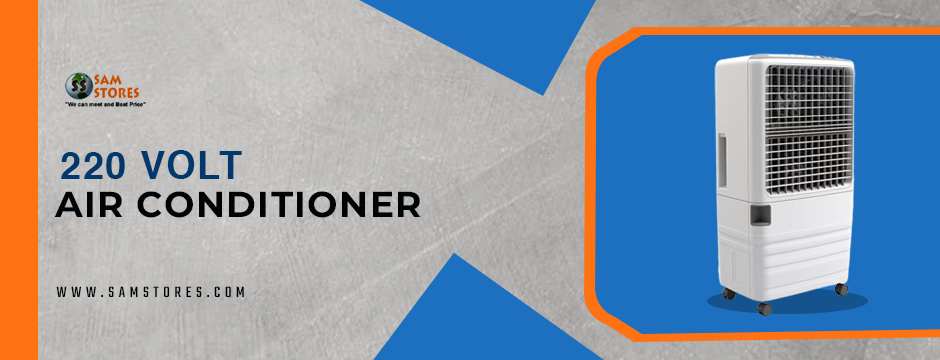The realm of air conditioning is presently witnessing a profound transformation, driven by technological innovations that are reshaping our approach to cooling indoor spaces. This blog will provide an in-depth exploration of the forefront advancements that symbolize the future of cooling, with a particular emphasis on the evolution of 220 volt air conditioner technology. From prioritizing energy efficiency to incorporating smart features, we will unravel how these breakthroughs are redefining the contours of cooling solutions.
1. Energy Efficiency Takes Center Stage:
In the quest for sustainable and environmentally friendly cooling solutions, energy efficiency emerges as a pivotal consideration. The trajectory of 220-volt air conditioners in the future orbits around sophisticated technologies meticulously crafted to optimize energy consumption while ensuring optimal performance. Manufacturers are progressively integrating variable-speed compressors, endowing the unit with the capability to modulate its speed in response to varying cooling requirements. This not only elevates comfort levels but also dramatically curtails energy wastage, aligning seamlessly with global initiatives for a more ecologically sustainable future.
2. Smart Cooling for Modern Living:
The integration of smart technology marks a new epoch in the domain of air conditioning. The future of 220-volt AC units is seamlessly intertwined with intelligent features, including Wi-Fi connectivity and compatibility with smart home ecosystems. Users are now empowered to remotely control their air conditioners through dedicated mobile applications, enabling them to set personalized schedules and monitor real-time energy usage. This level of control not only amplifies convenience but also contributes significantly to substantial energy savings, fostering a harmonious synergy between cutting-edge technology and energy-conscious living.
3. The Rise of IoT (Internet of Things):
As we navigate the 21st century, the integration of the Internet of Things (IoT) into our daily lives is reshaping the way we interact with technology, and air conditioning is no exception. The emergence of IoT is a pivotal aspect of the evolving landscape of interconnected living. Within this transformative paradigm, 220-volt air conditioners are assuming roles as indispensable components of smart home environments, marking a departure from conventional cooling systems.
Imagine a seamlessly connected ecosystem where your air conditioner operates as a dynamic entity within the larger framework of your home’s smart infrastructure. This entails a level of automation that extends beyond mere temperature control. In this envisioned future, your 220-volt air conditioner communicates effortlessly with your smart thermostat, forming a symbiotic relationship. This interaction allows your air conditioner to adapt its settings based on your personalized preferences and daily routines.
4. Eco-Friendly Refrigerants for Sustainability:
In response to the growing environmental consciousness of our society, the air conditioning industry is undergoing a profound shift towards sustainability. At the heart of this transformation is a commitment to adopting greener alternatives in the quest for a more eco-friendly future. The trajectory of 220-volt air conditioners is steering towards a departure from traditional refrigerants with higher global warming potential (GWP) to embrace alternatives that strike a delicate balance between efficient cooling performance and reduced environmental impact.
This shift represents a proactive response to global initiatives aimed at combating climate change. By transitioning to refrigerants with lower GWP, 220-volt air conditioners contribute to the overarching goal of reducing greenhouse gas emissions. The industry’s dedication to eco-friendly refrigerants not only aligns with environmental stewardship but also addresses the pressing need to mitigate the impact of air conditioning on the planet’s climate.
5. Advanced Air Purification Systems:
In a paradigm shift that extends beyond the conventional realms of cooling, the future of air conditioners places a heightened emphasis on enhancing indoor air quality. Modern 220-volt air conditioners are now equipped with sophisticated air purification systems that transcend the traditional scope of temperature regulation. These advanced systems are designed to actively capture, neutralize, and eliminate a spectrum of indoor pollutants, including allergens, pollutants, and microscopic particles.
The integration of such air purification capabilities serves as a cornerstone for creating a healthier indoor environment. This is particularly crucial for individuals with respiratory conditions, as these systems contribute to reducing airborne irritants that may exacerbate health issues. The holistic approach of modern 220 volt air conditioner units not only ensures a comfortable temperature but also promotes a living space characterized by superior air quality, aligning with the evolving expectations of conscientious consumers.
6. Inverter Technology Ensures Consistent Cooling:
In the realm of traditional air conditioning, a common challenge lies in the start-stop cycle that systems often employ. This operational mode not only results in temperature fluctuations but also leads to heightened energy consumption. Acknowledging these drawbacks, the future of 220-volt air conditioners pivots towards a solution: the integration of inverter technology.
The core principle behind inverter technology is dynamic adaptability. Unlike conventional systems that operate in a binary on-off fashion, inverter-driven compressors possess the ability to adjust their speed in real-time based on the cooling load. This intelligent modulation ensures that the air conditioner maintains a consistent temperature without the abrupt starts and stops associated with traditional units. The result is a more stable and comfortable indoor climate.
Conclusion:
As we delve into the future of cooling, propelled by innovations in 220 volt air conditioner technology, the trajectory of the industry is unmistakably aligned with the evolving needs of an energy-conscious and technologically advanced consumer base. The multifaceted advancements, ranging from energy-efficient designs to intelligent features and the adoption of eco-friendly refrigerants, collectively promise a paradigm shift in the way we approach indoor climate control.
These innovations extend beyond the conventional realms of temperature regulation. They encapsulate a commitment to sustainability, with a focus on minimizing environmental impact through the use of eco-friendly refrigerants. Simultaneously, the integration of smart features and IoT connectivity enhances user convenience, offering a glimpse into a future where air conditioning is seamlessly woven into the fabric of interconnected living.
